Foundation Cost Estimator
The foundation is one of the most crucial components of any construction project. It provides the necessary support to ensure the structural integrity of the building. Accurately estimating the cost of a foundation is essential for budgeting and planning your project. This guide will provide a detailed overview of the factors influencing foundation costs, a breakdown of different foundation types, and a practical cost estimator to help you plan effectively. Understanding the full scope of foundation costs can prevent budget overruns, ensure timely project completion, and help you make informed decisions about your construction project. A solid foundation cost estimate forms the backbone of a well-managed construction project, helping to allocate resources efficiently and avoid financial pitfalls.
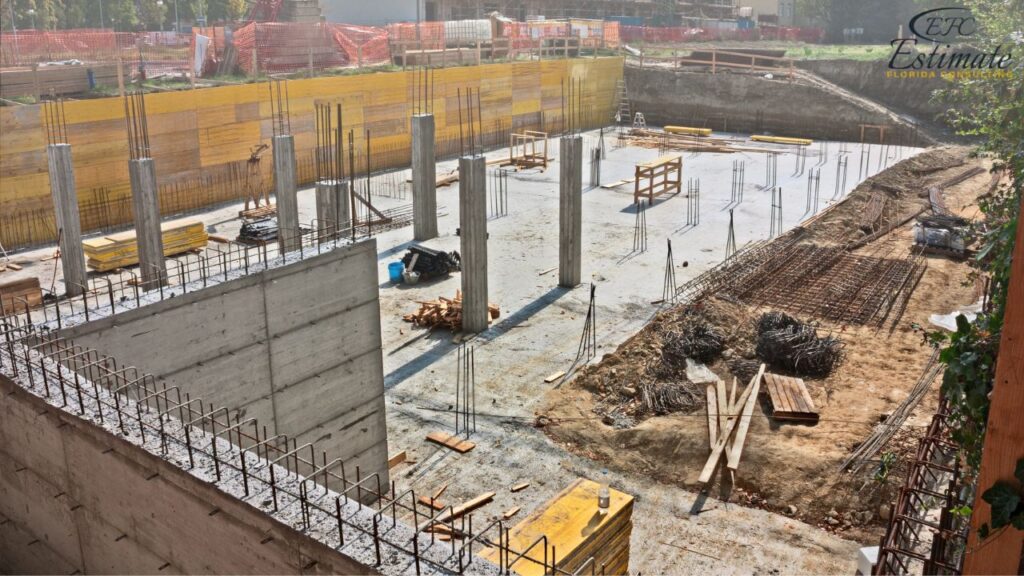
Why Accurate Foundation Cost Estimation Matters?
Accurate foundation cost estimation is vital because it affects the overall budget and timeline of the construction project. Underestimating the cost can lead to financial strain and delays, while overestimating can result in unused budget allocations. An accurate estimate ensures that you can plan your resources effectively, avoid unexpected expenses, and keep your project on track. Additionally, precise cost estimation builds credibility with stakeholders, helps secure necessary financing, and allows for better negotiation with contractors and suppliers. Accurate estimates also provide a benchmark for evaluating bids from contractors, ensuring that you receive fair and competitive pricing for your project. By providing a realistic picture of the costs involved, accurate estimation facilitates better decision-making and project management.
Foundation Videos
Basement Works
Huntington Apartments
Luxury Home Basement
Factors Influencing Foundation Costs
Several factors influence the overall cost of a foundation. These include the type of foundation, soil conditions, size and complexity of the building, labor costs, and regional price variations. Understanding these factors can help you develop a more accurate cost estimate and prepare for potential challenges. Each factor contributes to the overall cost in different ways, and a thorough analysis of these elements is essential for creating a reliable budget. Accurate cost estimation involves considering all variables and planning for potential uncertainties, ensuring a robust financial plan for your construction project.
Type of Foundation
The type of foundation chosen for a project significantly impacts the cost. Different foundation types have varying material and labor requirements, and their suitability depends on the building type, local soil conditions, and climate. Selecting the right type of foundation is crucial for the long-term stability and durability of the structure.
- Slab Foundation: $8,400 – $21,000
- A slab foundation is a flat concrete slab poured directly on the ground. It is one of the most cost-effective foundation types, suitable for warmer climates where the ground does not freeze. The cost can vary based on the thickness and reinforcement required. Slab foundations are popular for their simplicity and speed of construction, reducing labor costs and minimizing the risk of delays. This foundation type also offers a low profile, making it ideal for modern architectural designs. The straightforward construction process helps keep costs down and allows for quicker project completion.
- Example: A 1,500 sq ft slab foundation for a residential home. This type of foundation is ideal for single-story homes or buildings in regions with mild climates, providing a durable base with minimal maintenance requirements. The construction of slab foundations involves less excavation and simpler installation, contributing to lower overall costs.
- Crawl Space Foundation: $11,200 – $35,000
- A crawl space foundation includes a small space beneath the structure, allowing for access to plumbing and electrical systems. It is more expensive than a slab foundation but offers additional utility access. The cost depends on the height of the crawl space and the materials used. Crawl space foundations provide better protection against moisture and pests, making them a preferred choice in areas prone to damp conditions. This foundation type also allows for easier inspections and repairs, extending the lifespan of the building’s infrastructure. The elevated structure provides better ventilation, helping to prevent mold and mildew growth.
- Example: A 2,000 sq ft crawl space foundation for a residential home. This foundation type allows for easier maintenance and repairs, enhancing the longevity of the building’s infrastructure. The construction of crawl space foundations involves more materials and labor, resulting in higher costs compared to slab foundations.
- Basement Foundation: $42,000 – $105,000
- A basement foundation involves excavating a significant amount of soil and constructing a full-height space below the main structure. This type is the most expensive but provides additional living or storage space. The cost varies based on the depth of the basement and the materials used for waterproofing and insulation. Basement foundations offer significant advantages, such as additional square footage and enhanced structural support, making them suitable for multi-story buildings and cold climates. The added space can be used for various purposes, such as recreation rooms, storage, or even additional living quarters. The extensive excavation and construction efforts involved in basement foundations contribute to their higher cost.
- Example: A 3,000 sq ft basement foundation for a residential home. This foundation type increases the overall property value by providing usable space for recreation, storage, or even additional living quarters. The basement can also serve as a storm shelter, offering added safety in areas prone to severe weather. The cost of basement foundations is influenced by the need for waterproofing and insulation to prevent moisture problems.
- Pier and Beam Foundation: $11,200 – $42,000
- A pier and beam foundation consists of concrete piers or wooden posts supporting beams that hold up the structure. It is commonly used in areas with expansive soils or high water tables. The cost depends on the number and depth of piers required. Pier and beam foundations provide flexibility in construction and are particularly advantageous in flood-prone areas, as they elevate the structure above ground level. This type of foundation also allows for easy access to plumbing and electrical systems, facilitating maintenance and upgrades. The construction of pier and beam foundations involves more labor and materials compared to slab foundations, contributing to higher costs.
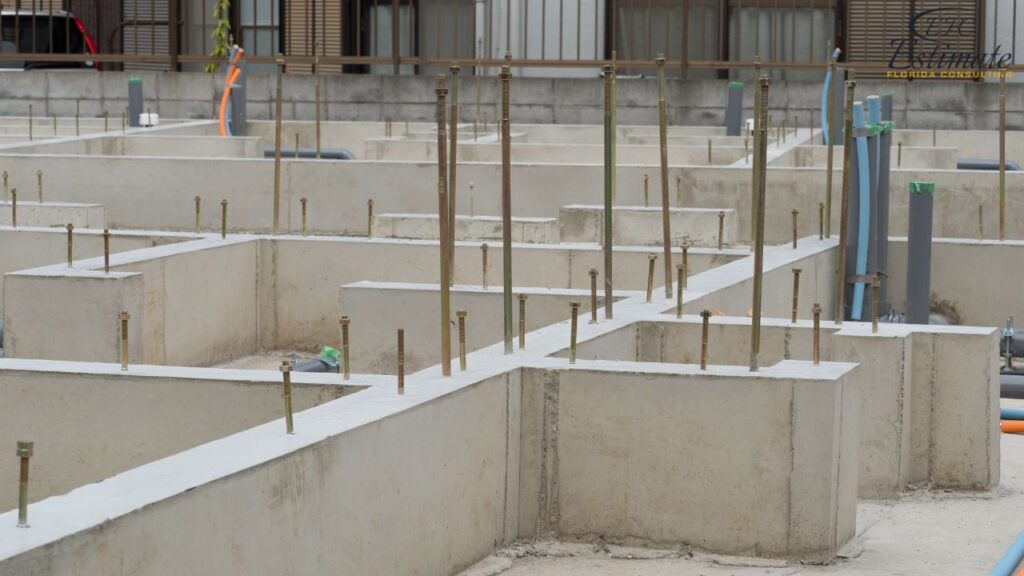
- Example: A 1,500 sq ft pier and beam foundation for a residential home. This foundation type allows for easier repairs and modifications to the building’s underside, such as plumbing and electrical systems. The elevated design also helps to protect the structure from termites and other pests. The cost of pier and beam foundations is influenced by the need for deeper and more numerous piers in areas with unstable soil conditions.
Soil Conditions
- Stable Soil: Minimal additional cost
- Stable soil types, such as gravel and sand, require less preparation and support, reducing foundation costs. These soils provide a firm base, minimizing the need for extensive reinforcement and reducing construction time. Stable soils also reduce the risk of settling and shifting, ensuring a long-lasting foundation. The natural drainage properties of stable soils help prevent water accumulation around the foundation, reducing the risk of moisture-related issues.
- Example: A residential home built on sandy soil, where minimal excavation and reinforcement are required, resulting in lower foundation costs. The natural stability of the soil allows for straightforward construction processes, minimizing the need for additional engineering or stabilization measures.
- Expansive Soil: Additional $7,000 – $21,000
- Expansive soils, such as clay, expand and contract with moisture changes, necessitating additional support and stabilization measures, increasing the cost. These soils require special treatment to prevent foundation movement and potential damage to the structure. Stabilization techniques may include chemical treatments, moisture control systems, and the use of specialized materials. The cost of addressing expansive soils includes both initial stabilization measures and ongoing maintenance to manage moisture levels.
- Example: A residential home built on clay soil, where soil stabilization techniques, such as chemical treatments or the use of geo-textiles, are necessary to ensure foundation stability. These measures help to mitigate the effects of soil movement and protect the integrity of the foundation. The construction process may involve additional excavation and the installation of drainage systems to manage water infiltration.
- Rocky Soil: Additional $14,000 – $35,000
- Rocky soils require extensive excavation and specialized equipment, significantly increasing foundation costs. The presence of large rocks and boulders necessitates additional labor and machinery to prepare the site adequately. Excavation in rocky terrain may also take longer, affecting the overall project timeline. The cost of working with rocky soils includes the use of heavy machinery and skilled labor to navigate challenging conditions.
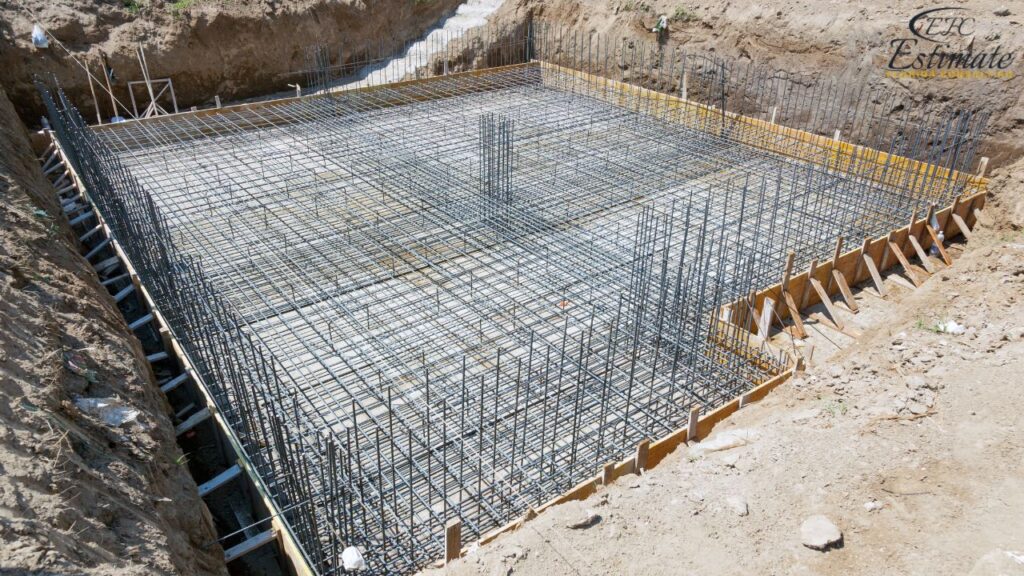
- Example: A commercial building constructed on rocky terrain, where heavy-duty excavation equipment is required to remove rocks and create a level foundation base. Specialized tools and techniques are necessary to handle the challenging excavation conditions. The construction process may involve blasting or breaking large rocks to facilitate foundation installation.
- Soft Soil: Additional $11,200 – $28,000
- Soft soils, such as silt and peat, may require soil stabilization and deep foundation systems, increasing costs. These soils lack the necessary load-bearing capacity, necessitating the use of piles or other deep foundation techniques to transfer loads to more stable strata. Soil stabilization methods may include compaction, the use of geogrids, and the addition of stabilizing agents. The cost of working with soft soils includes both initial stabilization efforts and ongoing monitoring to ensure foundation stability.
- Example: An industrial facility built on peat soil, where deep foundation systems, such as driven piles or drilled shafts, are used to ensure structural stability. These methods help to distribute the load more evenly and prevent settlement. The construction process may involve additional testing and monitoring to address any changes in soil conditions.
Size and Complexity of the Building
The size and complexity of the building also influence foundation costs. Larger buildings require more materials and labor, while complex designs with varying load-bearing requirements necessitate additional engineering and construction efforts. Detailed planning and precise engineering are essential to ensure the foundation can support the building’s weight and withstand environmental stresses.
- Small Buildings (1,000 – 2,000 sq ft): $8,400 – $42,000
- Small buildings require less material and labor, resulting in lower foundation costs. Simple designs with minimal load-bearing requirements can further reduce costs. Smaller buildings typically involve fewer complications, making the construction process more straightforward and cost-effective.
- Example: A small residential home with a basic slab foundation, where the straightforward design and smaller size minimize material and labor expenses. The limited scope of the project allows for quicker completion and reduced labor costs. Small buildings often require less excavation and fewer materials, which contributes to their lower overall cost.
- Medium Buildings (2,000 – 4,000 sq ft): $21,000 – $105,000
- Medium-sized buildings involve more materials and labor, increasing foundation costs. These projects may also require additional engineering to accommodate larger footprints and more complex structural requirements. The increased size and complexity necessitate more detailed planning and coordination.
- Example: A medium-sized commercial building with a crawl space foundation, where additional materials and labor are needed to support the building’s larger footprint and utility access requirements. The complexity of the design may involve more extensive site preparation and specialized construction techniques. Medium buildings often require more comprehensive soil analysis and reinforcement to ensure stability.
- Large Buildings (4,000+ sq ft): $42,000 – $210,000+
- Large buildings require extensive materials, labor, and engineering, significantly increasing foundation costs. Complex designs with multiple load-bearing points and additional features, such as basements or multiple stories, add to the overall expense. The construction of large buildings involves more significant challenges in terms of logistics, coordination, and quality control.
- Example: A large multi-story office building with a basement foundation, where substantial materials, labor, and engineering efforts are needed to ensure structural integrity and provide additional space. The foundation must support the weight of the entire structure, requiring advanced engineering solutions and high-quality materials. Large buildings often involve more extensive site preparation, including grading and utility installation.
Labor Costs
Labor costs are a significant component of foundation expenses. Skilled labor ensures that the foundation is constructed correctly and to the highest standards. Labor costs can vary based on the complexity of the project and the region where the construction takes place. Hiring experienced professionals is crucial to ensure the foundation meets all safety and quality standards.
- Basic Labor: $4,200 – $9,800
- Basic labor includes tasks such as excavation, formwork, and concrete pouring. These tasks are essential for creating a stable and level foundation base. Basic labor costs depend on the project’s size and the local labor market.
- Example: A residential home with a slab foundation, where basic labor tasks include site excavation, setting up formwork, and pouring the concrete slab. Basic labor ensures the foundation’s structural integrity and proper alignment. The efficiency and skill of the labor force directly impact the quality and durability of the foundation.
- Specialized Labor: $9,800 – $21,000
- Specialized labor includes tasks such as soil stabilization, waterproofing, and installing reinforcement materials. These tasks require skilled workers with specific expertise to ensure the foundation’s durability and stability. Specialized labor costs are higher due to the advanced skills and techniques involved.
- Example: A commercial building with a basement foundation, where specialized labor is needed for tasks such as waterproofing the basement walls, installing reinforcement bars, and ensuring proper drainage. Specialized labor ensures the foundation can withstand environmental stresses and provide long-term support for the building. The complexity and precision of specialized labor contribute to higher costs but also ensure higher quality and performance.
Download Template For Foundation Project Breakdown
- Materials list updated to the zip code
- Fast delivery
- Data base of general contractors and sub-contractors
- Local estimators

Regional Price Variations
Foundation costs can vary significantly based on regional price variations for materials and labor. Urban areas typically have higher costs due to increased demand and living expenses, while rural areas may offer lower prices but involve additional transportation costs. Understanding regional price variations helps in planning the budget more accurately.
- Urban Areas: Higher costs due to increased demand and living expenses.
- Urban construction projects often face higher costs for materials and labor due to the higher cost of living and increased demand for construction services. Urban areas may also have stricter regulations and higher permit fees, adding to the overall cost.
- Example: A residential home in a major city, where higher material and labor costs contribute to an overall increase in foundation expenses. The convenience of urban construction is balanced by higher costs for skilled labor and quality materials.
- Suburban Areas: Moderate costs with a balance between accessibility and price.
- Suburban areas offer a balance between the high costs of urban areas and the lower costs of rural regions. Construction projects in suburban areas benefit from easier access to materials and labor without the premium prices of urban centers. Suburban locations often provide a good mix of affordability and convenience.
- Example: A suburban home, where material and labor costs are moderate, providing a balance between affordability and accessibility. Suburban construction projects often benefit from a wide availability of suppliers and contractors, helping to control costs.
- Rural Areas: Lower material costs but potentially higher transportation costs.
- Rural construction projects may benefit from lower material costs but face higher transportation expenses due to the distance from suppliers and urban centers. Rural areas may also have limited access to specialized labor, requiring additional coordination and planning.
- Example: A rural home, where lower material costs are offset by the higher expenses associated with transporting materials and labor to the construction site. Rural projects often require careful logistical planning to ensure timely delivery and efficient use of resources.
Detailed Cost Breakdown
Here’s a detailed cost breakdown for different foundation types, including materials, labor, and additional costs.
Slab Foundation (1,500 sq ft)
Cost Component | Cost per Unit | Total Cost |
Materials | $5,600 – $11,200 | $5,600 – $11,200 |
Labor | $2,800 – $7,000 | $2,800 – $7,000 |
Excavation | $700 – $2,800 | $700 – $2,800 |
Reinforcement | $1,400 – $2,800 | $1,400 – $2,800 |
Total Cost | $8,400 – $21,000 |
A slab foundation is a cost-effective option suitable for many residential projects. This type of foundation involves pouring a flat concrete slab directly onto the ground, providing a stable base for the building. The total cost includes materials, labor, excavation, and reinforcement, ensuring a durable and reliable foundation. Slab foundations are popular due to their simplicity and speed of construction, making them an ideal choice for projects with tight budgets and timelines.
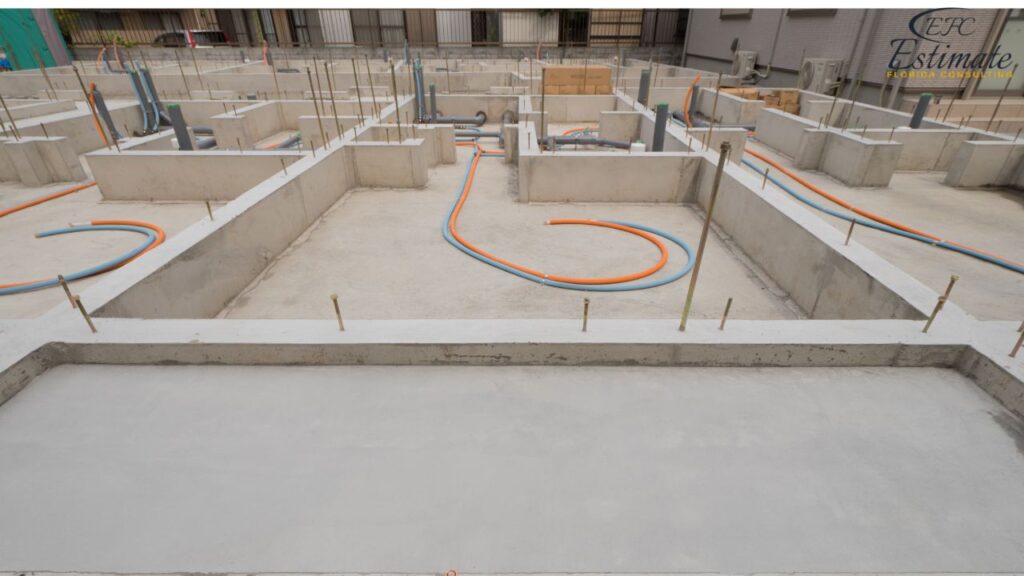
Crawl Space Foundation (2,000 sq ft)
Cost Component | Cost per Unit | Total Cost |
Materials | $7,000 – $16,800 | $7,000 – $16,800 |
Labor | $4,200 – $11,200 | $4,200 – $11,200 |
Excavation | $1,400 – $4,200 | $1,400 – $4,200 |
Waterproofing | $2,800 – $7,000 | $2,800 – $7,000 |
Total Cost | $11,200 – $35,200 |
A crawl space foundation provides additional utility access beneath the structure, allowing for easier maintenance and repairs. This type of foundation involves creating a small space between the ground and the building, which requires more materials and labor than a slab foundation. The total cost includes materials, labor, excavation, and waterproofing to protect the crawl space from moisture and pests. Crawl space foundations offer several advantages, including better insulation and protection against pests, making them a preferred choice for residential projects.
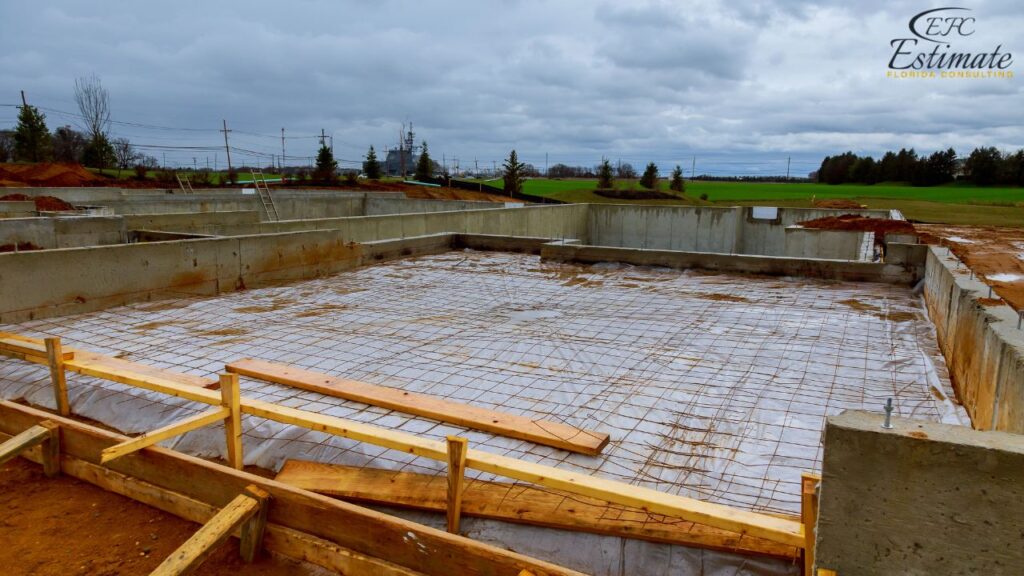
Basement Foundation (3,000 sq ft)
Cost Component | Cost per Unit | Total Cost |
Materials | $21,000 – $42,000 | $21,000 – $42,000 |
Labor | $14,000 – $35,000 | $14,000 – $35,000 |
Excavation | $7,000 – $14,000 | $7,000 – $14,000 |
Waterproofing | $7,000 – $14,000 | $7,000 – $14,000 |
Total Cost | $42,000 – $105,000 |
A basement foundation offers additional living or storage space below the main structure, making it a valuable addition to residential buildings. This type of foundation involves significant excavation and construction efforts, resulting in higher costs. The total cost includes materials, labor, excavation, and waterproofing to ensure the basement remains dry and structurally sound. Basement foundations are ideal for projects requiring additional space, such as multi-story homes, and provide excellent insulation and structural support.
Pier and Beam Foundation (1,500 sq ft)
Cost Component | Cost per Unit | Total Cost |
Materials | $5,600 – $14,000 | $5,600 – $14,000 |
Labor | $4,200 – $11,200 | $4,200 – $11,200 |
Excavation | $700 – $2,800 | $700 – $2,800 |
Pier Installation | $1,400 – $7,000 | $1,400 – $7,000 |
Total Cost | $11,200 – $35,000 |
A pier and beam foundation is commonly used in areas with expansive soils or high water tables. This type of foundation involves installing concrete piers or wooden posts to support beams that hold up the structure. The total cost includes materials, labor, excavation, and pier installation, providing a stable and elevated foundation for the building. Pier and beam foundations are advantageous in flood-prone areas, offering better protection against water damage and facilitating easier access for repairs and modifications.
Get 5 New Leads Next 7Days With Our System
- Multi-Family Building
- Hotel Building
- Hospital Building
- Warehouse Building
- High-Rise Building
- Shopping Complex
Foundation Types Comparison
Comparing different foundation types can help in making an informed decision based on your project’s specific requirements and budget constraints.
Foundation Type | Estimated Cost (1,500 sq ft) | Pros | Cons |
Slab Foundation | $8,400 – $21,000 | Cost-effective, quick installation | Limited access to plumbing and electrical |
Crawl Space | $11,200 – $35,200 | Better access to utilities, ventilation | Higher cost than slab, potential moisture issues |
Basement | $42,000 – $105,000 | Additional space, enhanced support | Most expensive, requires extensive excavation |
Pier and Beam | $11,200 – $35,000 | Elevated structure, easy access | Higher cost, requires more materials and labor |
Conclusion
Accurately estimating the cost of a foundation is a critical step in the planning and budgeting process for any construction project. By understanding the factors that influence foundation costs, such as the type of foundation, soil conditions, size and complexity of the building, labor costs, and regional price variations, you can develop a detailed and accurate cost estimate. This guide provides a comprehensive framework for estimating foundation costs, helping you plan your project effectively and ensure its success. Proper foundation cost estimation allows for better financial planning, reduces the risk of unexpected expenses, and ensures that your construction project remains on schedule and within budget. Ensuring accurate cost estimation helps secure funding, build stakeholder confidence, and facilitate smooth project execution from start to finish.
FAQs
Accurate foundation cost estimation is crucial because it affects the overall budget and timeline of the construction project. Underestimating costs can lead to financial strain and delays, while overestimating can result in unused budget allocations. An accurate estimate ensures effective resource planning, helps avoid unexpected expenses, and keeps the project on track. It also builds credibility with stakeholders, aids in securing financing, and facilitates better negotiation with contractors and suppliers.
Several factors influence the overall cost of a foundation, including:
- Type of Foundation: Different types (slab, crawl space, basement, pier and beam) have varying material and labor requirements.
- Soil Conditions: The type of soil (stable, expansive, rocky, soft) affects preparation and support needs.
- Size and Complexity of the Building: Larger and more complex buildings require more materials and labor.
- Labor Costs: Costs vary based on the project’s complexity and regional labor rates.
- Regional Price Variations: Costs can vary significantly based on location, with urban areas typically being more expensive.
- Slab Foundation (1,500 sq ft): $8,400 – $21,000
- Crawl Space Foundation (2,000 sq ft): $11,200 – $35,000
- Basement Foundation (3,000 sq ft): $42,000 – $105,000
- Pier and Beam Foundation (1,500 sq ft): $11,200 – $42,000
Soil conditions impact the preparation and support needed for a stable foundation:
- Stable Soil: Minimal additional cost.
- Expansive Soil: Additional $7,000 – $21,000 due to stabilization needs.
- Rocky Soil: Additional $14,000 – $35,000 for excavation and specialized equipment.
- Soft Soil: Additional $11,200 – $28,000 for stabilization and deep foundation systems.
Labor costs vary based on the complexity of the project:
- Basic Labor: $4,200 – $9,800 for tasks like excavation, formwork, and concrete pouring.
- Specialized Labor: $9,800 – $21,000 for tasks like soil stabilization, waterproofing, and installing reinforcement materials.
Foundation costs can vary significantly based on location:
- Urban Areas: Higher costs due to increased demand and living expenses.
- Suburban Areas: Moderate costs with a balance between accessibility and price.
- Rural Areas: Lower material costs but potentially higher transportation costs.
- Materials: $5,600 – $11,200
- Labor: $2,800 – $7,000
- Excavation: $700 – $2,800
- Reinforcement: $1,400 – $2,800
- Total Cost: $8,400 – $21,000
- Materials: $7,000 – $16,800
- Labor: $4,200 – $11,200
- Excavation: $1,400 – $4,200
- Waterproofing: $2,800 – $7,000
- Total Cost: $11,200 – $35,200
- Materials: $21,000 – $42,000
- Labor: $14,000 – $35,000
- Excavation: $7,000 – $14,000
- Waterproofing: $7,000 – $14,000
- Total Cost: $42,000 – $105,000
Google Reviews



Process To Get Foundation Estimate Report
Here I am going to share some steps to get foundation estimate report.
-
You need to send your plan to us.
You can send us your plan on info@estimatorflorida.com
-
You receive a quote for your project.
Before starting your project, we send you a quote for your service. That quote will have detailed information about your project. Here you will get information about the size, difficulty, complexity and bid date when determining pricing.
-
Get Estimate Report
Our team will takeoff and estimate your project. When we deliver you’ll receive a PDF and an Excel file of your estimate. We can also offer construction lead generation services for the jobs you’d like to pursue further.

